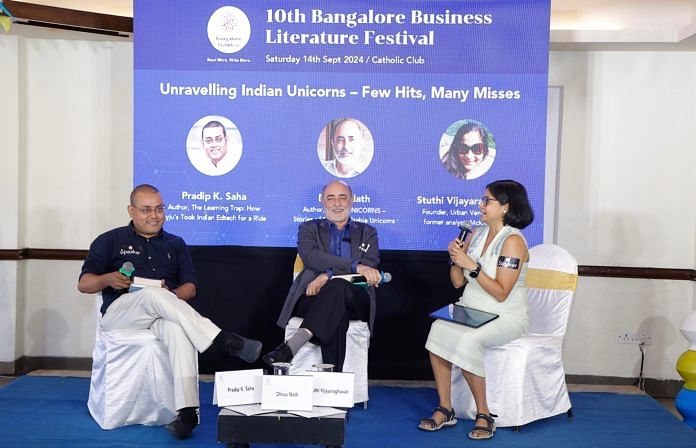Bengaluru: The tenth edition of the Bangalore Business Literature Festival saw business heads, investors, industry experts, entrepreneurs, readers and authors take stock of India’s start-up growth story. “[The goal] is to curate meaningful conversations between authors, business leaders and readers so that they make better-informed and more nuanced decisions about business, environment and life,” said author and academic V Raghunathan, chair of the Bangalore Business Literature Festival (BBLF). Success stories like Amrut, India’s single malt whisky, and startups like financial services firm Zerodha, and fantasy gaming platform Dream11 were shared and celebrated at the day-long festival held on 14 September at Bengaluru’s Catholic Club.
Apart from book launches, authors like Tanuj Bhojwani, Shalini Kapoor, Sriram Devatha, and Ravi Wazir took part in panel discussions that covered a range of topics from the art of writing to the role of artificial intelligence and the rise of food startups. But there was a cautionary note as well—in the form of edtech startup Byju’s. The unravelling of the edtech firm has put a question mark on the future of internet-related startups with investors now losing confidence in funding this space, said Pradip K Saha, whose debut book, The Learning Trap: How Byju’s Took Indian Edtech for a Ride won the C.

K. Prahalad Best Business Book Award. “People like to believe that founders of such companies are gods.
..but we shouldn’t put them on such a pedestal,” said Saha in conversation with author Dhruv Nath at a session titled, ‘Unravelling Indian Unicorns – Few Hits, Many Misses’.
But he wasn’t only talking about Byju’s. Later, in a podcast with host Mohua Chinappa, he wondered if investor interest is on the wane. “ Investors are increasingly getting fed up with mythical profits.
They are no longer interested in loss-making unicorns, but instead want companies to show them a path to profitability,” said Nath, author of The Earnicorns: Stories of Rare Profitable Unicorns. The Learning Trap took a toll on Saha’s mental health. Once word got out that he was piecing together the story, he allegedly received multiple threats.
“The toxicity was almost like second-hand smoking,” he said. “ The company claimed that my reporting was wrong. I was asked once if I should be held responsible if the company had to fire 20,000 people the next day.
” There are lessons—both good and bad–to be learned. It wrote the playbook on advertising and marketing. “Their approach toward learning, advertising, and marketing was that unique.
..that you could ask random people on the road about Byju’s and they would know what it is,” Saha said.
At its peak, Byju’s was everywhere—endorsed by Shah Rukh Khan, the Indian cricket team, and even partnering with FIFA, splashed across billboards, TV, and newspapers. However, not all sales tactics were heavily advertised. “There were different sales departments with a weekly roster and set targets.
It was shocking to see the kind of language being used in these WhatsApp channels...
there was a lot of shouting, cuss words if the salespersons didn’t meet their targets,” said Saha. During his research, current and former employees of the firm told him that the sale of the product was the ultimate goal, and that they were asked to do anything and everything to make that happen. Families, especially those from the lower income bracket, would be urged to take loans to pay the fees.
“It wasn’t even communicated to the parents that they were entering into a loan agreement with a third party and not Byju’s themselves,” Saha said. While parents from low-income backgrounds are now struggling to repay loans, the company’s former employees struggle to get a job elsewhere. “The company fell into doom and dragged others too.
” Also read: Dalit printing press to Murugan—Chennai exhibition is all about caste counterculture It wasn’t all doom and gloom at the BBLF. Writers are retelling stories of startups defying loss-making trends, positioning them as ideal business models. One such lesser-known success story shared at the fest was that of India’s first single malt – Amrut, made by a Bengaluru-based company.
“You are travelling abroad, and want to take an Indian-branded product as a gift. How many brands can you actually think of that fit this criteria? What is something that is made in India and hence can be gifted with pride?” asked Bengaluru-based author Sriram Devatha at a session titled “The Spirit of India”, moderated by Mohua. Devatha’s book, Amrut – The Great Churn: The Global Story of India’s First Single Malt, takes off from 1948 when JN Radhakrishna Jagdale set up Amrut Laboratories in Bengaluru to manufacture alcohol for his pharmaceutical firm, Associated Drug Company.
The author traces the growth of the old-fashioned, small, family-owned business and stops at every corner of the world where the Indian-made Amrut Fusion made a mark before earning international acclaim. One unique aspect of the company’s marketing strategy, according to Devatha, was its initial target audience – not the Indians who were sceptical of Amrut in the initial days, but the luxury whiskey market in Europe. “It received endorsements from renowned experts in the West including whiskey expert Jim Murray,” said Devatha, adding that the Indian market had to stand up and take note of the brand’s global success.
“From Britain to India and back, the exchange of whisky had come full circle,” Devatha wrote in his book, which was released in July 2024. Similarly, in the session with Saha, Nath devolved into the success stories of four market giants — Naukri.com, Zerodha, Zoho, and Dream11 – that increasingly focused on their customers and employees as well.
“The founders of each of these companies were very clear that they would look after their teams, and they will make sure that its people are both happy and productive...
not one over the other,” Nath said. Focusing only on number-oriented growth is not enough. Byju’s served as the reminder.
One of the challenges that everyone agreed on was access to the internet in villages and small towns of India. It’s not an easy road in the face of reduced investor support, but the opportunities are huge, said Nath. He gave the example of Patna-based startup, Agrix, which connects farmers with businesses and service providers for agriculture-related products.
“The model has been adapted from Urban Company. You might not need a beautician in a village but a farmer will need access to agricultural services, which this app (Agrix) provides,” he explained. For all the pitfalls, Nath is optimistic about the future of startups and their growth story.
“More such companies will come up in the future. These will not be mythical companies but real profit-making ones with an unrelenting focus on the consumer.” (Edited by Ratan Priya) var ytflag = 0;var myListener = function() {document.
removeEventListener('mousemove', myListener, false);lazyloadmyframes();};document.addEventListener('mousemove', myListener, false);window.addEventListener('scroll', function() {if (ytflag == 0) {lazyloadmyframes();ytflag = 1;}});function lazyloadmyframes() {var ytv = document.
getElementsByClassName("klazyiframe");for (var i = 0; i < ytv.length; i++) {ytv[i].src = ytv[i].
getAttribute('data-src');}} Save my name, email, and website in this browser for the next time I comment. Δ document.getElementById( "ak_js_1" ).
setAttribute( "value", ( new Date() ).getTime() );.



















